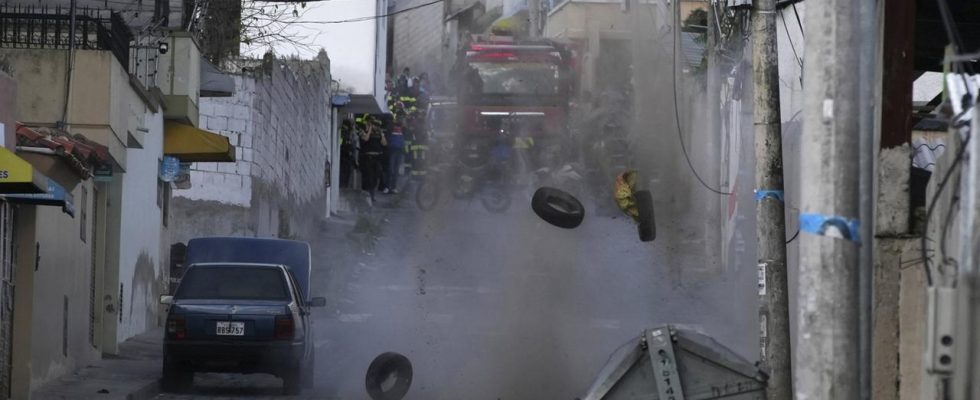background
In just three years, peaceful and emerging Ecuador has become one of the most dangerous countries in Latin America. Drug gangs infiltrate state institutions and terrorize the population. Now the state is fighting back.
Alina Manrique had to sit on the news studio floor with her colleagues when the 13 masked and heavily armed men stormed the station.
The news editor was preparing the afternoon edition of Canal TC when a gun was held to her head. For the next 30 minutes, huddled together with presenters, cameramen and other editors, she was scared to death. She repeatedly had to look into gun barrels and heard colleagues, forced by the gangsters, sending messages to President Daniel Noboa over the station asking him to stop the fight against drug gangs.
Incredibly, the live broadcast continued for minutes. The whole country could watch on television as masked men obviously put sticks of dynamite in journalists’ pockets, beat them with machetes and repeatedly forced them to spread their messages.
“I’m still in shock,” Manrique told the AP news agency afterwards. “Everything in this country is collapsing. It’s time for me to leave this country and go as far away as possible.”
Drug gangs blackmail the state with terror
Political analyst and organized crime expert Renato Rivera Rhon is also critical of Ecuador’s development. For him, the country is at the beginning of a spiral of violence and, more recently, terror arising from the conflicts between rival drug gangs. “Part of the problem is that although organized crime is directed at the state, it involves the population. They send their messages of terror to the citizens.”
Alina Manrique and her colleagues from Canal TC escaped with great shock, but with their lives. After half an hour, a special unit stormed the studio and freed the hostages. The hostage takers allowed themselves to be led away without resistance.
But that same afternoon there were 20 scenes of violence in the coastal city of Guayaquil alone where the gangs spread terror. Shots were also fired and there were hostage-taking and kidnappings in the capital Quito and in Esmeraldas in the northwest. Videos of gruesome executions of police officers are circulating on the Internet.
In some places, the perpetrators also sent a message to President Daniel Noboa that “you don’t play with cartels.” Whether the videos are real and show actual executions cannot be verified at the moment. The background to the hostage-taking cannot be clearly explained. It’s certainly a show of force, but it could also be that the drug cartels wanted to keep the police busy and do a big business elsewhere.
The origin of the violence dates back years
Until 2009, there was a United States Air Force base in the coastal town of Manta. Their presence helped slow the spread of drug cartels in Ecuador.
Ecuador’s former president Raphael Correa (2007 to 2017) terminated the base contract. As a result, Noboa’s previous governments under Lenín Moreno and Guillermo Lasso may have underestimated the activities of the drug cartels.
Noboa criticized his predecessors after the escalation of violence on Wednesday, saying: “We have now taken measures that should have been taken long ago, but which the previous governments did not want to take. We are being attacked with armed force, that’s why “It’s time to confront them with weapons.”
Maybe the last chance for Ecuador
After a drug lord escaped from prison on Sunday, Noboa initially imposed a state of emergency with curfews and restrictions on the right to assembly in the country. In response, the situation escalated on Tuesday.
While what was happening in the country was still completely unclear, the president declared martial law by decree. He spoke of an internal armed conflict, declared 22 drug gangs as belligerents and authorized the military to destroy them under UN international humanitarian law.
Noboa, who has only been in office since November, is going “all in”. He is using everything his country has to offer in terms of firepower to combat organized crime. This could also be his only chance to win Ecuador’s drug war. The conditions are not good.
An ex-entrepreneur without the full support of his institutions
Daniel Noboa was a banana entrepreneur before his political career. He is only 36 years old, has little political experience – but above all he has hardly any time. Because he won an early election, his term is only 18 months until the next election. If he wins his war, his re-election is likely to be secured. If he plunges his country into chaos of violence and crime, someone else will most likely continue the fight in a year and a half – and his name could possibly be Raphael Correa again.
If Noboa had all the state power behind him, the victory against the gangs could be easier. But organized crime has infiltrated all government organizations. The police, military, judges and public prosecutors have been infiltrated. Corrupt public servants open all doors to drug lords, says analyst Renato Rivera Rhon, concluding: “Given this weakness of institutions, it is very unlikely, at least in the short term, that the state will succeed.”

